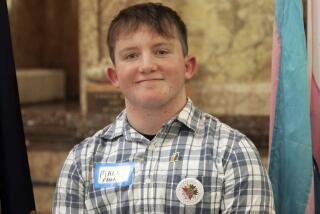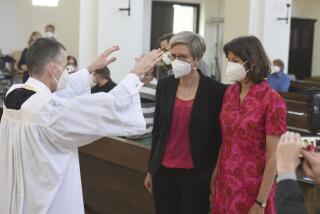A Historic Day in Vermont as Civil Unions Become Legal
- Share via
BRATTLEBORO, Vt. — Mindful of a law banning booze on municipal property, Annette Cappy will stop short of serving champagne. But to the town clerk in this southern Vermont village, opening her office just after midnight this morning--the minute that civil unions between same-sex couples become legal here--seems like the right thing to do.
“This office has been known to stay open for 24 hours on the first day of hunting season,” Cappy said. “I figure if we did it for people who want to shoot animals, I can do it for two people in love.”
Sure enough, as the nation’s most sweeping gay rights legislation takes effect today, scores of couples from around Vermont, and some from outside the state, will descend on town halls to plunk down $20 for a license giving them everything heterosexual couples have--except the word “marriage.” Much of the state is celebrating, but some opponents of what amounts to gay marriage are less than overjoyed. Though no one could predict just how many civil union licenses would be issued today, some who sought them laughed about Vermont’s new argot.
“David and I are saying we’re being unionized,” said John Castaldo, who can now legally refer to his companion of eight years, David Myette, as his spouse. The couple lives in Waterbury, where Castaldo, 51, works for a granite consortium and Myette, 52, handles financial aid for a small college.
With a 9 a.m. appointment to get their civil union license from the town clerk in tiny Williston, 57-year-old Lynn Goyette said she and Eileen Blackwood, 41, would continue to call each other what for 13 years they always have. “Hon.”
Perhaps predictably, a clever strain of commercialism is finding its way into the weekend’s celebrations. Jewelers from around the state pushed “civil union rings.” Bakers made sure to have lots of same-sex wedding figures on hand to stick on top of cakes. A boutique brewery (owned by lesbians) issued a new golden amber, Gay Pride Ale. Brewery partners Liz Trott and Janice Moran marketed their elixir with the slogan, “The beer to come out for.”
300 Benefits Extended to Same-Sex Couples
Vermont’s groundbreaking law extends more than 300 benefits normally associated with marriage to gay and lesbian couples. To couples who form a civil union, inheritance rights are now automatic, as are the authority to make medical decisions for an incapacitated partner, the right to take control of a partner’s body upon death, the right to transfer property from one partner to another without tax consequences and the right to be treated as an economic unit for tax purposes. Conversely, a civil union must be dissolved in a court proceeding similar to divorce.
“It’s a huge step,” said Blackwood, a lawyer. Three years ago, after 10 years together, she and Goyette, a mental health counselor, held a giant, weeklong celebration to affirm their commitment among family and friends. They wear rings because, Goyette said, “we’re ring people.” But both see marriage as a patriarchal institution--so much so that when the law passed, Blackwood called Goyette to crow, “Guess what, we don’t have to get married!”
Still, the pair saw civil union status as such a significant civil rights victory that they wanted to be among the first to sign up. “In this case,” said Blackwood, “the personal is definitely political.”
Though the benefits of the bill passed in April after sometimes agonizing debate do not apply outside Vermont, some couples nonetheless trekked here from other states and places. Cappy had appointments for couples from New York, New Jersey, North Carolina and Washington, D.C.
“It’s by far the greatest thing that’s happened to gay people in the United States,” said John Campbell, who is driving to Vermont from Edison, N.J., for a civil union ceremony with Richard Harrison, his partner of 13 years.
Campbell, a retired VA Hospital administrator, is 70 (“you would ask”) and HBO executive Harrison is 45. “But he was the aggressor,” Campbell insisted. “He went after a dirty old man like me and he got me.” Long ago they drew up living wills, put all their possessions in both names and began wearing matching rings. So to some extent, they conceded, their vows in Vermont before a justice of the peace will be symbolic only.
“We’re just celebrating the fact that a state is recognizing a relationship like ours,” Campbell said. “If it was marriage, we’d be coming home and throwing a big reception. But it’s not, so we won’t be doing that. We’re just so excited that this is happening.”
Not everyone shares this enthusiasm. The town clerks in half a dozen or so Vermont hamlets resigned rather than distribute civil union licenses. “It’s a moral issue with me,” explained Helen O’Donnell, as she resigned the clerkship of Tunbridge. “I don’t want my name on a document supporting that.”
A group of 15 state legislators promised to renew their efforts after they lost a court battle to overturn the law. Groups with names like Vermont Speaks, Vermonters Taking a Stand and Vermonters for Traditional Marriage have sprouted in direct opposition of the law. Gov. Howard Dean, a Democrat who changed his mind after initial opposition, last week wrote the state’s Catholic bishop, urging him to make sure that “hatred and intolerance will have no place” in the debate.
Milestone Comes Amid Court Defeat
Vermont’s breakthrough in civil rights for gays and lesbians takes effect, moreover, in the same week when they suffered a bitter defeat as the U.S. Supreme Court approved banning gays from leadership positions in the Boy Scouts.
But Bill Lippert, the state’s only openly gay legislator, said the progress in Vermont is irrevocable. “Despite all the threats by all the opponents we will never go back,” said Lippert, who helped draft the legislation.
“The significance goes well beyond the couples who are adult right now,” he said. “For the young gay and lesbian people, they now get to grow up with the image of the choice and the possibility of forming loving, deeply committed relationships that can be affirmed with all the legal protections and rights that any other couple can have, at least in the state of Vermont.”
Castaldo said one reason they were delaying their ceremony until August is that Myette’s 26-year-old son from a long-ago marriage would be home from Japan to stand up for his father. An Episcopal priest will administer their vows at their home, with splendid mountain views all around. After eight years together, Castaldo said he and Myette will trade rings and probably wear suits for the ceremony, then change into shorts for a grand old barbecue.
“Why do it?” asked Castaldo. “I think we want to take our relationship up one level. We both realize we want to be able to do this commitment for ourselves spiritually, but I think a lot has to do with legal protection. Our biggest fear is that if one of us is sick, we would be denied access.”
The same concerns prompted Holly Puterbaugh, 54, and Lois Farnham, 55, to join the lawsuit three years ago that helped lead to the new law. The pair adopted and raised a daughter, now 19. Their fireplace is a small shrine to the concept of family, a word spelled out in wooden blocks, lest there be any confusion. They have lived together almost 28 years.
Puterbaugh, a mathematics instructor at the University of Vermont, and Farnham, a school nurse supervisor, invited hundreds of people to their civil union celebration today in South Burlington. Later in the summer, they will honeymoon in Nova Scotia.
Hours before the big day, they were still pinching themselves in happy disbelief. For years it had seemed that the state-sanctioned relationship--”legitimization,” in Puterbaugh’s words--would remain elusive. So for their celebration, they chose a song, “The Impossible Dream,” to reflect their feelings.
Was the Green Mountain state setting the stage for the rest of the country? Advocates are optimistic that several other states, including Hawaii and New Hampshire, may consider similar measures. “I hope so,” said Farnham. “I hope so.”
More to Read
Sign up for Essential California
The most important California stories and recommendations in your inbox every morning.
You may occasionally receive promotional content from the Los Angeles Times.










